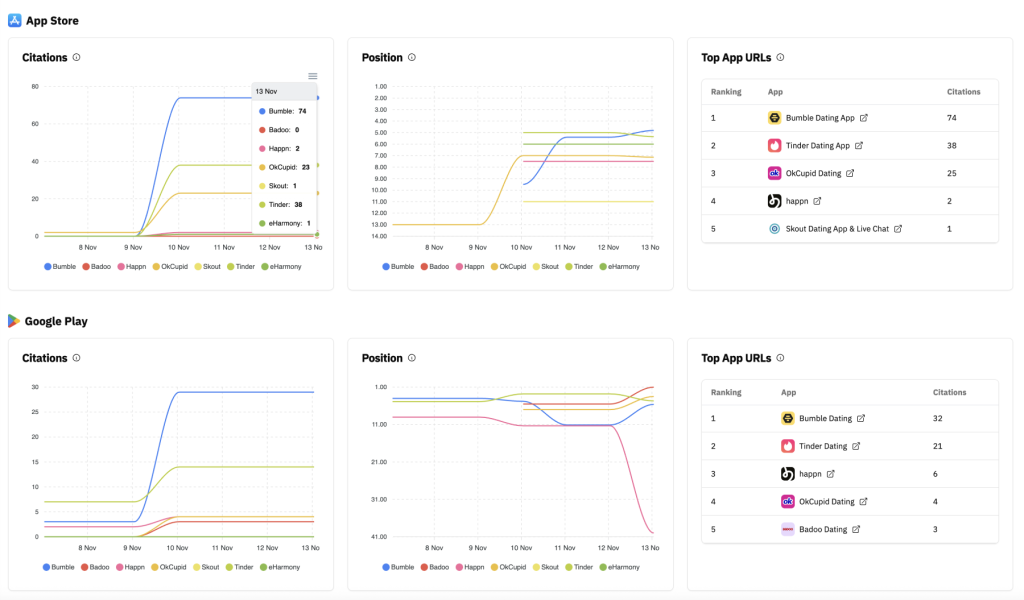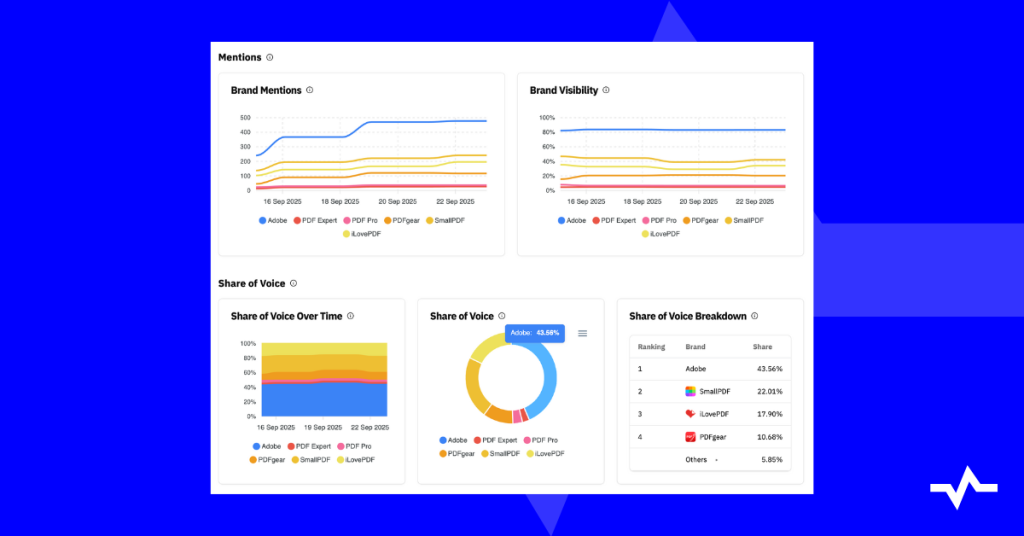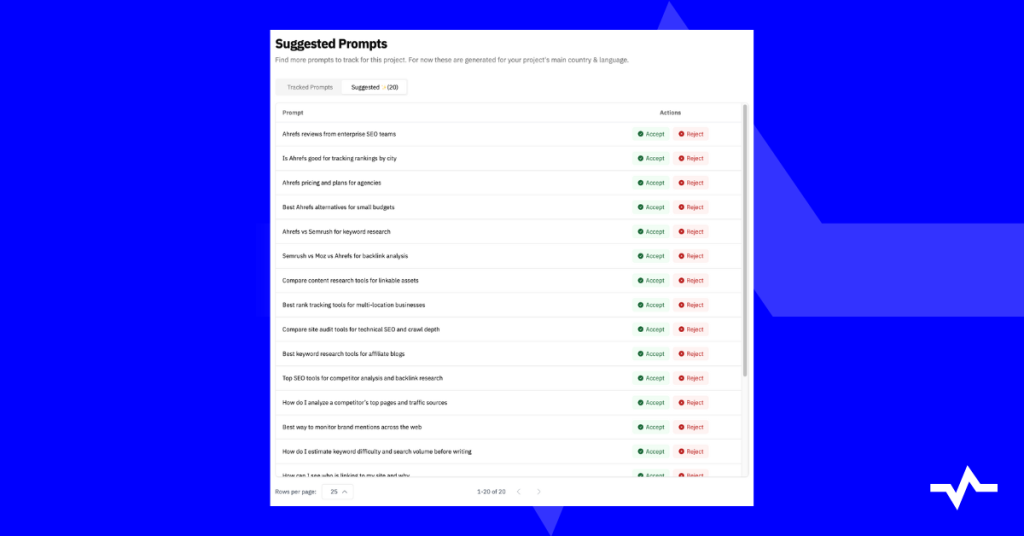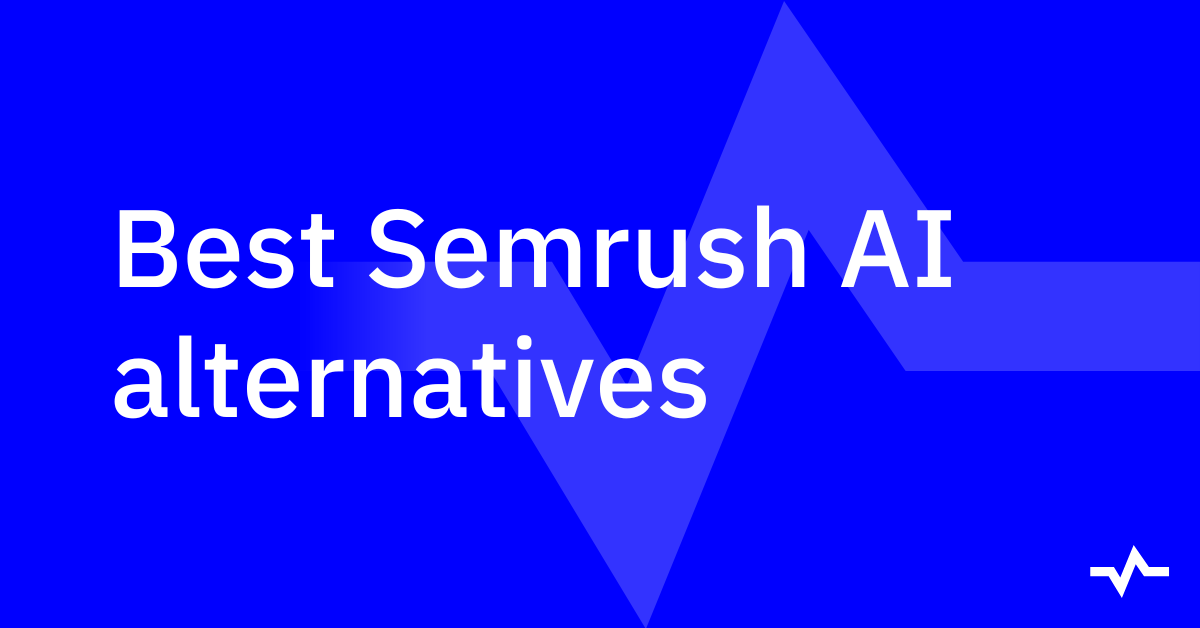Semrush has been a staple in the SEO toolkit for years, and their recent addition of AI Overview tracking shows they’re trying to adapt to the changing search landscape. But is Semrush the best choice for tracking your visibility in AI-powered search engines?
If you’re specifically looking to optimize for ChatGPT, Perplexity, Google AI Mode, and other AI search platforms, you might find that dedicated alternatives offer deeper insights and better value.
Table of Contents
In this guide, we’ll explore the best alternatives to Semrush’s AI features, what each platform offers, and how to choose the right one for your needs.
What does Semrush offer for AI search tracking?
Before diving into alternatives, let’s clarify what Semrush actually provides:
- AI Overview tracking: Semrush added the ability to track when your brand or domain appears in Google’s AI Overviews. This includes monitoring AI Overview triggers for your target keywords and seeing which sources Google’s AI cites.
- Integration with existing tools: The AI tracking is bundled into Semrush’s broader platform, which includes traditional rank tracking, backlink analysis, content optimization, and competitive research.
- Pricing: Semrush’s AI features come with their standard plans starting at $139/month for Pro (which is limited in scope), $249/month for Guru, or $499/month for Business. There’s no standalone AI tracking option.
- Limitations: As of now, Semrush focuses primarily on Google AI Overviews. They don’t track visibility in ChatGPT, Perplexity, Claude, Gemini, or other standalone AI search engines.
Why look for alternatives?
There are several reasons you might want to explore other options:
- Platform coverage: If you need to track visibility beyond just Google AI Overviews (like ChatGPT, Perplexity, or other AI platforms), you’ll need a more comprehensive solution.
- Cost efficiency: If you’re primarily interested in AI search optimization rather than traditional SEO, paying for Semrush’s full suite might not make sense.
- Depth of AI insights: Dedicated AI visibility platforms often provide more granular data like citation analysis, prompt-level tracking, and AI-specific competitor benchmarking.
- Specialization: Tools built specifically for the AI search landscape tend to evolve faster with new features as the space develops.
Best alternatives to Semrush for AI search tracking
1. LLM Pulse
What it does: LLM Pulse is a dedicated AI search visibility platform that tracks how your brand appears across ChatGPT, Perplexity, Google AI Mode, and AI Overviews.
Key features:
- Multi-platform tracking across the major AI search engines
- Citation mention detection to see when you’re referenced
- Competitor benchmarking to compare your AI visibility against rivals
- Prompt-level insights to understand which queries trigger your brand
- Share of voice metrics across different AI platforms
- Track visibility changes over time with historical data

Best for: Brands and agencies that want comprehensive AI search visibility tracking across multiple platforms, not just Google.
Pricing: Self-serve plans from 49€ / month with free trial available. More accessible than enterprise-only options while still providing professional-grade tracking.
Pros:
- Covers more AI platforms than Semrush
- Built specifically for AI search optimization
- Regular updates as new AI search platforms emerge
- Citation tracking shows not just visibility but actual mentions
Cons:
- Doesn’t include traditional SEO features like backlink analysis or keyword research
- Newer platform compared to established names like Semrush
- Requires separate tool if you also need traditional SEO tracking

2. BrightEdge
What it does: Enterprise SEO platform that added generative AI tracking to their suite. Focuses heavily on content optimization with AI insights.
Key features:
- Generative AI tracking across multiple engines
- Content recommendations based on AI search patterns
- Integration with their broader content marketing platform
- Enterprise-grade analytics and reporting
Best for: Large enterprises already invested in BrightEdge’s ecosystem or those needing both traditional SEO and AI tracking at scale.
Pricing: Enterprise pricing (typically $10,000+ annually). Not publicly listed.
Pros:
- Comprehensive platform combining traditional and AI search
- Strong enterprise features and support
- Advanced content optimization capabilities
- Robust integrations with marketing tech stacks
Cons:
- Very expensive compared to alternatives
- Overkill for small to medium businesses
- Requires significant onboarding and training
- Long contract commitments typical
3. Authoritas
What it does: SEO platform that added AI Overview tracking to their existing rank tracking capabilities.
Key features:
- AI Overview monitoring as part of rank tracking
- Traditional SEO metrics and reporting
- Multi-location tracking
- API access for custom integrations
Best for: Agencies and enterprises already using Authoritas who want to add AI tracking without switching tools.
Pricing: Custom enterprise pricing, typically mid-market to enterprise level.
Pros:
- Good integration if you’re already in their ecosystem
- Combines traditional and AI search tracking
- Strong agency features
Cons:
- AI features feel more like an add-on than core focus
- Limited to Google AI Overviews
- Pricing not accessible for smaller businesses
- Less specialized in AI search optimization
4. Advanced Web Ranking
What it does: Rank tracking platform that added some AI Overview tracking capabilities.
Key features:
- AI Overview tracking alongside traditional ranks
- White-label reporting for agencies
- Multi-location and device tracking
- Historical data and trend analysis
Best for: Agencies looking for an affordable option that combines traditional rank tracking with basic AI Overview monitoring.
Pricing: Starts around $49/month, making it one of the more affordable options.
Pros:
- Much more affordable than Semrush or enterprise options
- Good for agencies with white-label reporting
- Combines traditional and AI tracking in one tool
Cons:
- AI tracking is basic compared to dedicated platforms
- Only tracks Google AI Overviews
- Less frequent updates for AI features
- Limited depth of AI-specific insights
5. Custom tracking solutions
What it does: Building your own dashboard using APIs from ChatGPT, Perplexity, and other platforms, combined with Google Search Console data.
Key features:
- Fully customizable to your specific needs
- Can track exactly what matters to you
- No recurring subscription costs once built
- Complete control over data and methodology
Best for: Technical teams with development resources and very specific tracking requirements.
Pricing: Development time + API costs (varies widely).
Pros:
- Total customization
- Ownership of your tracking system
- Can be cost-effective at scale
- No vendor lock-in
Cons:
- Requires significant technical expertise
- Ongoing maintenance burden
- Time-consuming to build and iterate
- API costs can add up
- No out-of-the-box reporting or visualizations
How to choose the right alternative
Choosing the best Semrush alternative depends on your specific situation:
Choose LLM Pulse if:
- You want dedicated AI search visibility tracking across multiple platforms
- You don’t need traditional SEO tools bundled in
- You’re specifically optimizing for AI search engines beyond just Google
- You want citation tracking and competitor benchmarking for AI

Choose BrightEdge if:
- You’re an enterprise with significant budget
- You need both traditional SEO and AI tracking at scale
- Content optimization is a priority
- You want white-glove service and support
Choose Authoritas or Advanced Web Ranking if:
- You primarily need traditional rank tracking but want basic AI monitoring
- You’re an agency needing white-label reporting
- Budget is a major constraint
- You’re okay with Google AI Overviews being the only AI platform tracked
Stick with Semrush if:
- You’re already heavily invested in their ecosystem
- You need their full suite of SEO tools
- You only care about Google AI Overviews, not other AI platforms
- Traditional SEO is still your primary focus with AI as secondary
Build custom if:
- You have specific tracking needs no platform addresses
- You have technical resources available
- You need to integrate deeply with proprietary systems
- You’re tracking at massive scale where custom becomes cost-effective
The future of AI search tracking
The AI search landscape is evolving rapidly. What started with Google’s AI Overviews has expanded to include ChatGPT search, Perplexity, Claude, Gemini, and numerous other platforms experimenting with AI-powered search.
Semrush made a smart move adding AI Overview tracking, but as a generalist SEO platform, they’ll likely continue to focus on Google’s ecosystem rather than tracking every emerging AI search engine.
If AI search optimization is becoming central to your strategy, a dedicated platform will give you better coverage and deeper insights. If traditional SEO remains your primary focus with AI as a secondary concern, Semrush or similar all-in-one platforms might still make sense.
The key is understanding where your audience is actually searching and making sure you’re tracking visibility on those platforms, not just the ones your current tool happens to cover.

Getting started with AI search tracking
Whichever alternative you choose, here are some best practices:
- Start with a baseline: Before investing in any tool, manually test your visibility across different AI platforms to understand your starting point.
- Focus on platforms that matter: Don’t track everything. Identify which AI search engines your target audience actually uses.
- Track competitors: AI search visibility is relative. Knowing you appear 30% of the time means little without knowing your competitors appear 60% of the time.
- Monitor citations, not just visibility: Being mentioned is good, but being cited as a source is better. Look for tools that distinguish between these.
- Connect to business outcomes: Track not just visibility but whether that visibility correlates with brand searches, traffic, or conversions.
The shift to AI search is real, and having proper tracking in place now will give you a significant advantage as more users adopt these platforms. Whether you choose LLM Pulse, stick with Semrush, or explore another alternative, the important thing is to start measuring your AI search visibility before your competitors do.
FAQ
What are the main limitations of the Semrush AI Visibility Toolkit compared to newer AI visibility platforms?
The toolkit gives a good general overview, but it lacks the depth needed to understand how AI engines build their answers. It does not track fan-out queries, citation weight or sentiment, so brands miss important signals about why they appear, how strongly they are referenced and how they compare to competitors.
Which features are missing in the Semrush AI Visibility Toolkit that other tools provide?
More advanced platforms offer daily monitoring, structured citation data, sentiment scoring and multi-engine comparison across ChatGPT, Perplexity, Google AI Mode and Bing AI. These capabilities allow teams to see not just whether they appear in answers, but how often, in what context and with what level of authority.
How does the Semrush AI Visibility Toolkit measure visibility across ChatGPT, Perplexity and Google AI results?
It mainly measures presence at a high level, which is useful but limited. It does not break down the order of mentions, the strength of citations, or the specific sources the AI pulled from. As a result, brands get visibility numbers, but not the underlying story behind how each engine reaches its conclusions.
When should a brand consider switching from the Semrush AI Visibility Toolkit to a more specialized AI visibility solution?
A switch becomes valuable when AI search starts influencing acquisition, reputation or competitive strategy. If a brand needs precise insight into how it is cited, how sentiment shifts across engines or how competitors gain visibility, a more specialized tool offers far richer data and clearer decision-making support.
What factors matter most when choosing an alternative to the Semrush AI Visibility Toolkit for tracking brand citations and share of voice?
The key factors are depth of tracking, number of engines covered and the quality of the citation-level data. Tools that measure sentiment, fan-out queries, ranking order and update frequency offer a more realistic picture of how AI systems perceive and recommend a brand, which is essential for shaping strategy.

